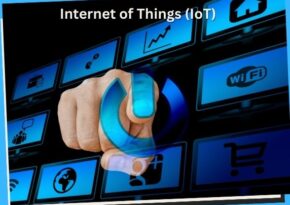
The Future of Supply Chain: Unleashing IoT Innovations! 🌟
🚀 Unlock the power of IoT for supply chain efficiency. Learn how it’s transforming operations, reducing costs, and enhancing competitiveness. 📊💪
IoT in Supply Chain Management: A Game-Changer for Efficiency and Transparency 📦🌐
In the fast-paced world of modern business, supply chain management is a critical component that can make or break a company’s success. Enter the Internet of Things (IoT), a revolutionary technology transforming supply chains’ operations. IoT in supply chain management offers unprecedented visibility, real-time data, and automation, creating a more efficient, cost-effective, and transparent process from end to end. This comprehensive article will explore how IoT is reshaping supply chains, its benefits, and the exciting future it promises. 📦🌐🤖
Understanding IoT in Supply Chain Management
The Internet of Things (IoT) refers to the network of interconnected devices, sensors, and systems that can collect and exchange data over the Internet. In supply chain management, IoT technology involves embedding sensors and communication capabilities into various supply chain elements, from raw materials and manufacturing equipment to vehicles and distribution centers. These IoT-enabled components then collect and share real-time data, offering insights to optimize the entire supply chain process.
1. Enhanced Visibility and Tracking 🚚
One of the most significant benefits of incorporating IoT into supply chain management is gaining real-time visibility and tracking of goods and assets at every journey stage. This transparency can be a game-changer for supply chain stakeholders:
- Asset Tracking: IoT sensors can be attached to shipping containers, pallets, and vehicles. These sensors provide precise location data, enabling companies to track their assets’ movements, reduce theft, and optimize asset utilization.
- Inventory Management: IoT sensors in warehouses and distribution centers monitor inventory levels, send alerts when stock is running low, and provide insights into product conditions such as temperature and humidity, ensuring product quality.
- Real-Time Shipment Monitoring: IoT-equipped shipments can transmit real-time temperature, humidity, and shock data. This information is crucial for sensitive goods like pharmaceuticals and food products.
2. Predictive Maintenance ⚙️
IoT technology allows for predictive maintenance, which can save companies substantial costs by reducing unplanned downtime and extending the lifespan of machinery and equipment:
- Condition Monitoring: IoT sensors on manufacturing equipment can continuously monitor their condition, detecting anomalies and predicting when maintenance is needed. This proactive approach minimizes unexpected breakdowns.
- Fleet Management: In logistics, IoT-equipped vehicles can monitor their own health, optimizing routes and predicting maintenance needs, thereby reducing the likelihood of breakdowns during deliveries.
3. Inventory Optimization 📊
Optimizing inventory levels is a perpetual challenge in supply chain management. IoT helps address this challenge:
- Demand Forecasting: IoT sensors can collect data on customer demand patterns, enabling companies to adjust their inventory levels more accurately and avoid overstocking or understocking.
- Shelf-Level Monitoring: IoT devices on store shelves can monitor inventory levels in real-time, ensuring that products are restocked promptly to meet consumer demand.
4. Automation and Efficiency 🤖
IoT-enabled automation is a key driver of supply chain efficiency:
- Smart Warehouses: IoT sensors and robotics can automate warehouse tasks, from inventory retrieval to order fulfillment, reducing human error and labor costs.
- Route Optimization: IoT devices on vehicles can analyze traffic conditions and weather data in real time, optimizing delivery routes and reducing fuel consumption.
5. Quality Control and Compliance 🧪
IoT technology helps ensure product quality and regulatory compliance:
- Temperature and Humidity Monitoring: IoT sensors can monitor temperature and humidity levels for products requiring specific environmental conditions, assuring that goods meet quality standards.
- Documentation and Traceability: IoT-enabled tracking provides a detailed digital record of a product’s journey through the supply chain, making it easier to comply with regulations and recall products if necessary.
Challenges and Considerations
While the benefits of IoT in supply chain management are substantial, several challenges and considerations must be addressed:
- Data Security: IoT devices transmit sensitive data, making them vulnerable to cyberattacks. Robust security measures are essential to protect this information.
- Integration: Integrating IoT technology with existing supply chain systems and processes can be complex and costly. Compatibility and interoperability issues must be overcome.
- Cost: Implementing IoT solutions, including purchasing sensors and the required infrastructure, can be expensive. A careful cost-benefit analysis is necessary.
- Privacy Concerns: IoT sensors collect data from products, assets, and individuals involved in the supply chain. Ensuring privacy compliance is critical.
- Maintenance: IoT devices require regular maintenance and software updates to function correctly. Neglecting maintenance can lead to disruptions in the supply chain.
The Future of IoT in Supply Chain Management
The future of IoT in supply chain management holds tremendous promise, with several exciting trends on the horizon:
- Blockchain Integration: Combining IoT with blockchain technology can enhance supply chain transparency and traceability, reducing fraud and errors.
- 5G Connectivity: The rollout of 5G networks will enable even faster and more reliable data transmission for IoT devices, improving real-time tracking and decision-making.
- Edge Computing: Edge computing allows data processing to occur closer to the source (e.g., IoT sensors), reducing latency and enabling quicker responses to critical events.
- Artificial Intelligence (AI) Integration: AI algorithms can analyze vast amounts of IoT data to provide predictive insights, optimize operations, and detect anomalies.
- Environmental Sustainability: IoT technology will play a crucial role in reducing the environmental impact of supply chains by optimizing transportation routes and minimizing waste.
Conclusion
Integrating IoT technology into supply chain management is revolutionizing how businesses operate. IoT is streamlining supply chains by providing real-time visibility, predictive maintenance, and automation, reducing costs and enhancing overall efficiency. As IoT continues to evolve and integrate with other emerging technologies like blockchain and AI, its potential to transform supply chains becomes even more significant.
However, implementing IoT in supply chain management requires careful planning, investment, and attention to security and privacy concerns. Companies that embrace this transformative technology stand to gain a competitive edge in an increasingly interconnected and data-driven world. With IoT, supply chains are not just a logistical network but a dynamic, responsive ecosystem that drives business success. 📦🌐🤖
Related Queries
IoT revolution in supply chain management
Future of supply chain with IoT innovations
Efficiency in supply chain operations with IoT
IoT elevates supply chain visibility
Data-driven logistics and IoT insights
Streamlining shipping with IoT
Smart solutions for smarter supply chains with IoT
IoT and inventory management in stock control
Competitive advantage with IoT in supply chain
Evolving supply chain with IoT integration
Save/Share this story with QR CODE
Disclaimer
This article is for informational purposes only and does not constitute endorsement of any specific technologies or methodologies and financial advice or endorsement of any specific products or services.
📩 Need to get in touch?
Feel free to Email Us for comments, suggestions, reviews, or anything else.
We appreciate your reading. 😊Simple Ways To Say Thanks & Support Us:
1.) ❤️GIVE A TIP. Send a small donation thru Paypal😊❤️
Your DONATION will be used to fund and maintain NEXTGENDAY.com
Subscribers in the Philippines can make donations to mobile number 0917 906 3081, thru GCash.
3.) 🛒 BUY or SIGN UP to our AFFILIATE PARTNERS.
4.) 👍 Give this news article a THUMBS UP, and Leave a Comment (at Least Five Words).
AFFILIATE PARTNERS

World Class Nutritional Supplements - Buy Highest Quality Products, Purest Most Healthy Ingredients, Direct to your Door! Up to 90% OFF.
Join LiveGood Today - A company created to satisfy the world's most demanding leaders and entrepreneurs, with the best compensation plan today.



 Business Technology, Finance Technology & Information Technology
Business Technology, Finance Technology & Information Technology





